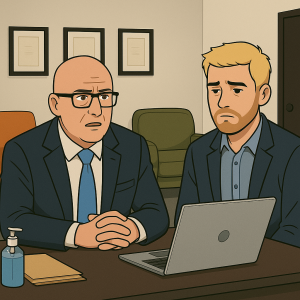1. Victim and Witness Rights
- Colorado Crime Victim Rights Act (VRA)
Outlines the legal rights of victims during the criminal justice process, including court notifications, restitution, and protective measures. - Colorado Organization for Victim Assistance (COVA)
Connects victims with compensation, shelter, crisis services, and legal support across the state.
2. Free and Low-Cost Legal Aid Programs
- Colorado Legal Services
Offers free legal representation and resources for stalking, harassment, protective orders, and civil disputes. - Rocky Mountain PBS – Legal Help Center
Provides access to legal clinics and online tools for harassment, abuse, and housing-related issues.
3. Relevant Laws
- Stalking: C.R.S. § 18-3-602
What it means: Involves repeated conduct that causes fear for safety, including threats, following, surveillance, or digital contact. Known as “Vonnie’s Law.” - Harassment: C.R.S. § 18-9-111
What it means: Covers physical contact, obscene messages, threats, and repeated communication that seriously annoys or alarms another person. Applies to in-person and electronic behavior. - Bullying: No specific adult criminal statute. Addressed under education law (C.R.S. § 22-32-109.1).
What it means: School bullying and cyberbullying are addressed through state education codes. Public schools must adopt anti-bullying policies, including reporting procedures and student protections. - Defamation: Civil tort, not criminal. Governed by Colorado case law and common law principles.
What it means: Defamation includes false written (libel) or spoken (slander) statements that harm someone’s reputation. Victims must prove falsity, harm, and in some cases, actual malice. No criminal statute exists.
4. Reporting and Hotlines
- Dial 911 in emergencies or if you’re in immediate danger.
- Non-emergency complaints may be filed with your local law enforcement agency or through the Colorado Bureau of Investigation tip line.
- Violence Free Colorado
Connects survivors to local crisis centers, legal advocates, and safety planning tools. - Statewide Domestic Violence Hotline: 1-800-500-3430
Provides 24/7 confidential assistance and referrals across Colorado.
5. Support Organizations
- Violence Free Colorado
State coalition of programs supporting victims of domestic and sexual violence, stalking, and harassment. - SafeHouse Denver
Offers emergency shelter, legal services, and survivor advocacy in the Denver metro area.
6. Civil Remedies and Protection Orders
Colorado allows victims to file for a Civil Protection Order (CPO) in cases of stalking, abuse, or threats. Temporary and permanent orders can be requested at county courts. Legal aid services and domestic violence advocates can help with the filing process.
Important Note on Jurisdiction: If the individual you are seeking a restraining order against lives in a different state, your local court may not have jurisdiction to enforce that order. In most cases, you must file for protection in the state where that individual resides or where the conduct occurred. This applies even in situations involving online harassment, defamation, or stalking. Contact legal aid services in both your state and the other person’s state for guidance.
7. Youth and School Resources
- Colorado Department of Education – Bullying Prevention
Offers guidance, district policies, and tools to report bullying or harassment in schools.
8. Court Forms and Filing Help
- Colorado Courts – Protection Orders
Self-help center for filing civil protection orders, including instructions and downloadable forms.
9. Online Safety and Privacy Tools
- NNEDV Tech Safety Toolkit
Offers digital safety advice, privacy protection strategies, and tools for managing cyber abuse.
Disclaimer: This information is provided for educational purposes only and does not constitute legal advice.




